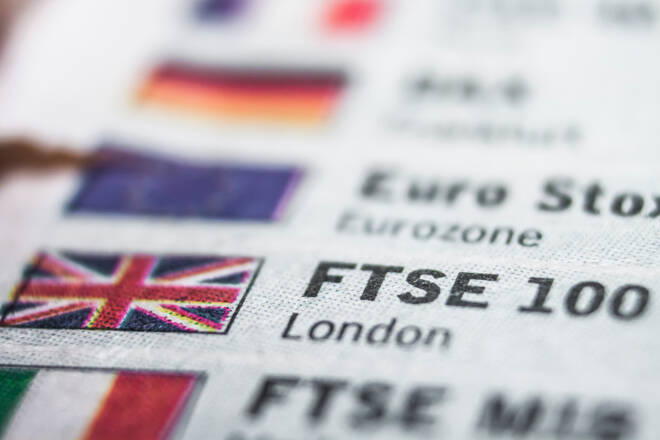Advertisement
Advertisement
DAX Index, FTSE 100, STOXX 600: German Recession Threats, UK’s Falling Inflation Shape Market Trends
By:
DAX fluctuates amid Germany's recession risk; FTSE-100 climbs with UK inflation relief, hinting at consumer spending rise.
Key Points
- Germany’s GDP contraction signals DAX volatility.
- FTSE-100 benefits from UK’s reduced inflation rate.
- Central bank policies heavily influence DAX and FTSE-100.
Euro Zone GDP and Recession Risks
European stocks are moving higher on Tuesday, driven by investor reactions to the latest GDP figures from the euro zone. Key indexes like the Stoxx 600, Germany’s Dax, and the UK’s FTSE-100 all reported gains, indicating a positive shift in investor sentiment.
At 11:28 GMT, the broad-based Stoxx 600 Index is trading 486.09, up 1.25 or +0.26%. Germany’s Dax Index is at 16963.81, up 22.10 or +0.13% and the UK’s FTSE-100 Index is trading 7676.30, up 43.56 or +0.57%.
Despite this, concerns loom as Germany, Europe’s economic powerhouse, exhibited a contraction in its economy by 0.3% in the fourth quarter of 2023. This contraction places Germany on the verge of a recession, following two consecutive quarters of stagnant growth.
Mixed Economic Performance Across the Euro Zone
The economic landscape across the euro zone presents a mixed picture. While Germany faces potential recession, other major economies like France reported zero growth in the same period. In contrast, Italy and Spain showed modest expansions, growing at 0.2% and 0.6% respectively. This divergence in economic performance across key European nations suggests a complex and uneven recovery path post-pandemic.
Renault’s Strategic Shift and Market Response
Renault’s decision to scrap its plans for an IPO of its electric vehicle unit, Ampere, sparked a 5% surge in its shares. This move, deviating from its previous ambition to compete with major EV players, reflects the shifting strategies in the evolving automotive sector. Renault’s stock fluctuated following the announcement, highlighting market sensitivity to corporate strategy shifts.
Sector-Specific Movements
In other market news, British advertising giant WPP’s shares climbed 6.5% due to newly announced financial targets and cost-cutting strategies. Conversely, Delivery Hero’s shares fell by 6% following its decision to divest from Deliveroo, indicating a cooling demand in the delivery service sector.
UK Inflation Trends
The UK market received a boost from favorable inflation data, as shop price inflation plummeted to its lowest in nearly two years. This decrease to 2.9% in January, down from 4.3% in December, marks the continuation of a seven-month downward trend. This easing inflation reflects aggressive discounting strategies by retailers during the festive season.
Short-Term Outlook
About the Author
James Hyerczykauthor
James Hyerczyk is a U.S. based seasoned technical analyst and educator with over 40 years of experience in market analysis and trading, specializing in chart patterns and price movement. He is the author of two books on technical analysis and has a background in both futures and stock markets.
Advertisement
